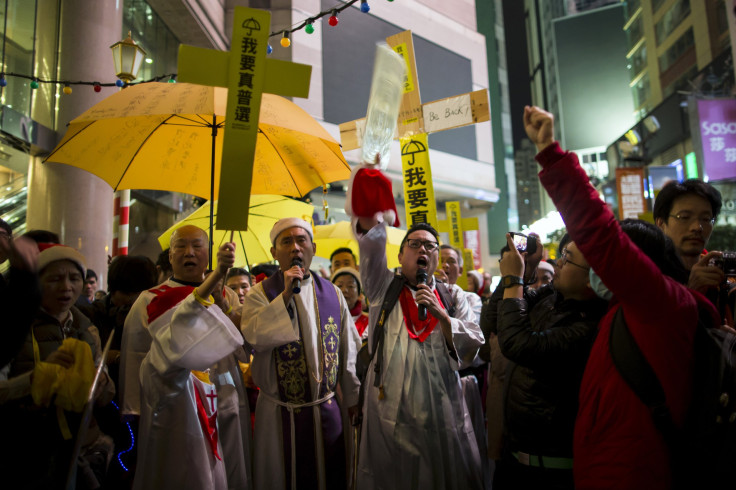Hong Kong Police Arrest 37 Pro-Democracy Demonstrators In Second Night Of Protests

HONG KONG -- Police in the city arrested 37 pro-democracy protesters overnight, in the largest action taken against demonstrators since protest camps in the city were cleared earlier this month. The arrests came on the second consecutive night of protests in the area.
In a statement, police said that demonstrators had blocked roads in the busy shopping district of Mong Kok overnight, and defied orders to leave. Those arrested ranged in age from 13 to 76, according to The Associated Press. About 300 demonstrators took part in what police called an “illegal occupation,” which turned into a five-hour stand-off between protesters and officers. Those arrested face charges of disorderly conduct in a public place and criminal damage, according to the South China Morning Post.
The arrests followed protests in the city on Christmas Eve, in which around 100 protesters blocked roads and unfurled banners reading, “We want true universal suffrage,” and attempted to march on government headquarters. Police made 12 arrests at the Dec. 24 protest.
This week's protests have been the first to see significant numbers of arrests since police moved, in early December, to clear out the three protest camps that had paralyzed parts of the city for over two months. Although the protest camps were cleared in a mostly peaceful manner, with most protesters agreeing to leave voluntarily, a core of strong supporters remained at each protest site and defied police orders to leave, prompting hundreds of arrests, but no violence.
Despite the end of the occupation, activists in the city are keen for the pro-democracy movement to continue in a different form. Demonstrators who spoke to International Business Times during the clearance of the main protest site earlier this month envisioned the movement continuing with “more mobile” tactics, or sporadic large protests around significant holidays.
Activists had struggled to make any headway on achieving their aims during the occupation, with the Hong Kong government saying that it lacked the authority to change a ruling from the central government. Protesters are seeking to elect the city's next chief executive by “international democratic standards,” but China has ruled that all candidates for the post must be approved by a committee stacked with Beijing loyalists.
© Copyright IBTimes 2024. All rights reserved.






















